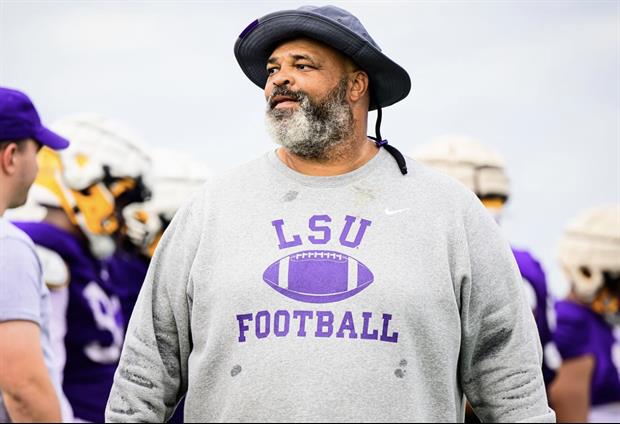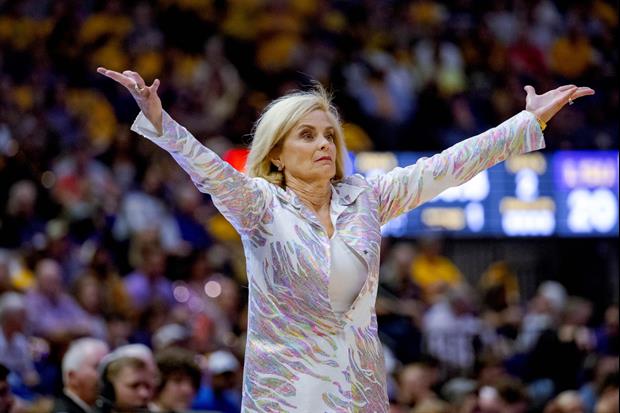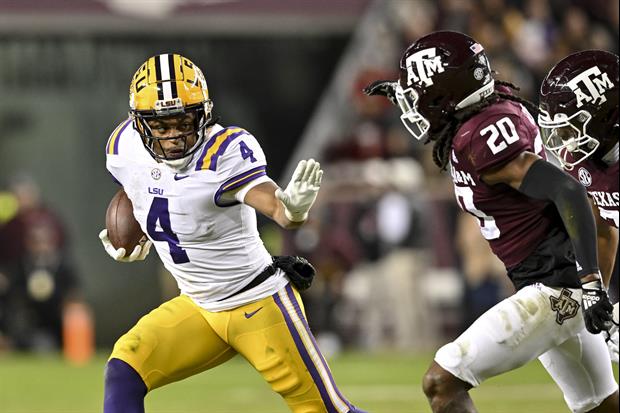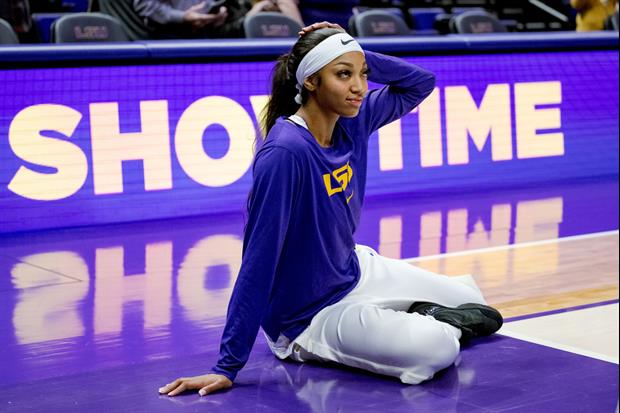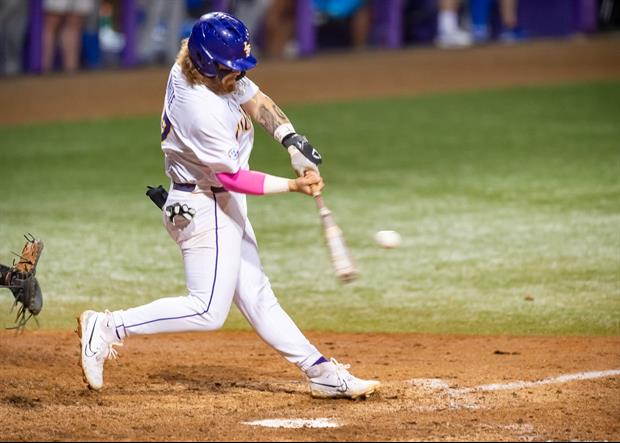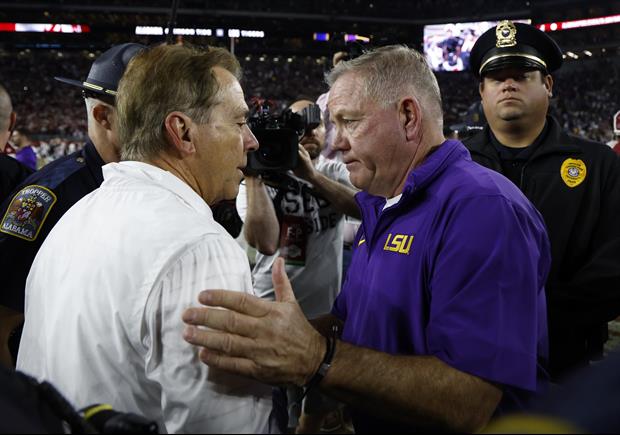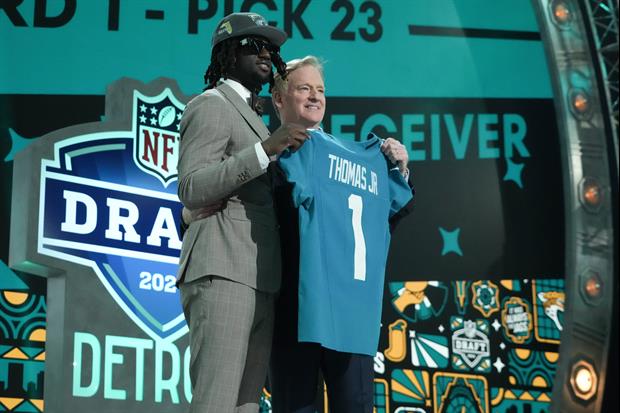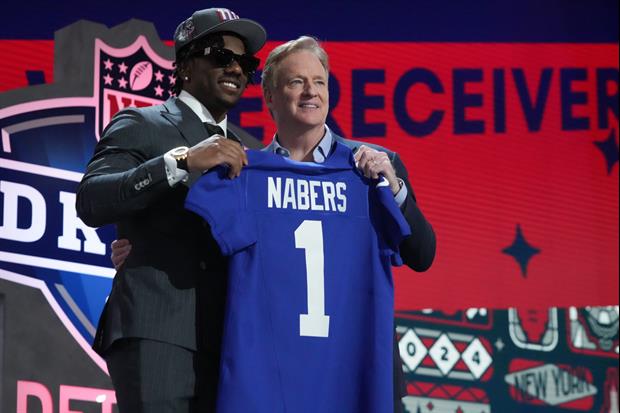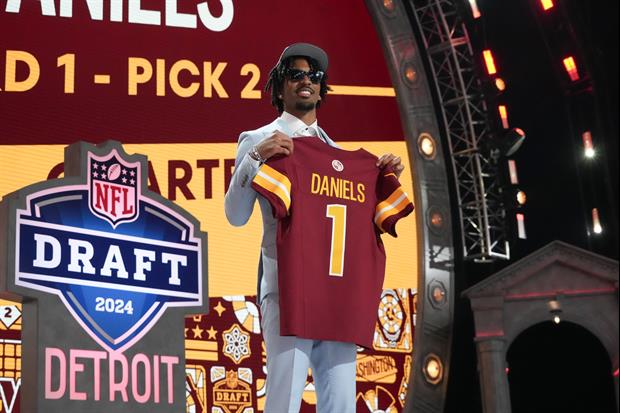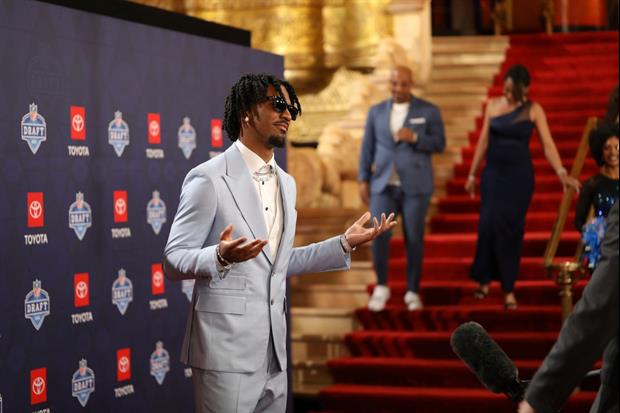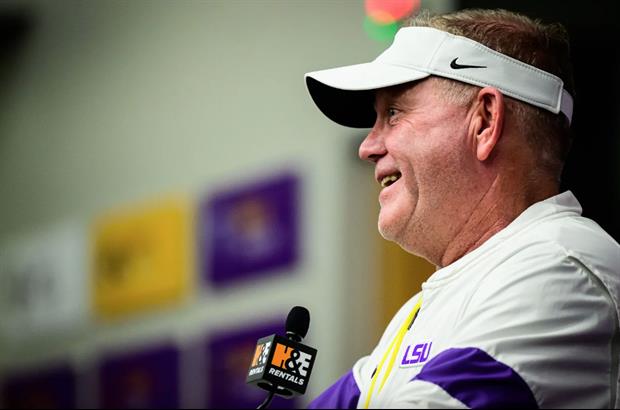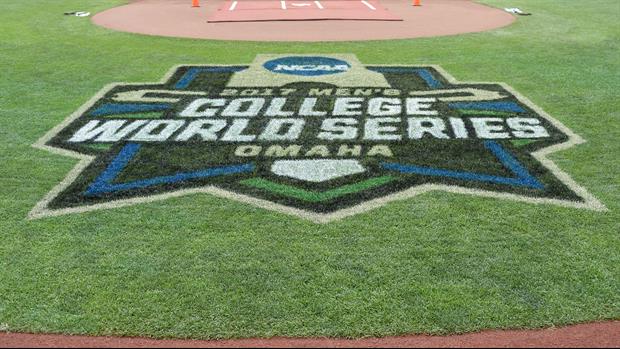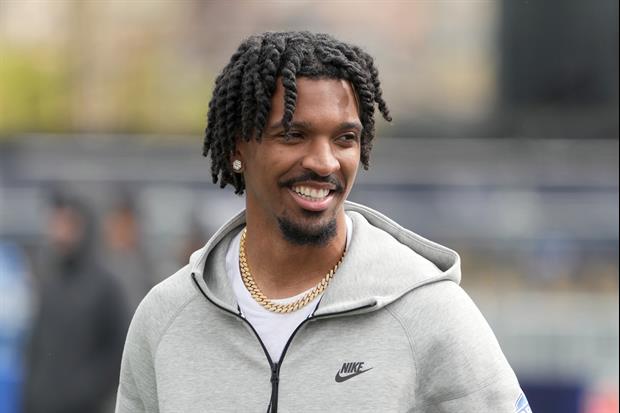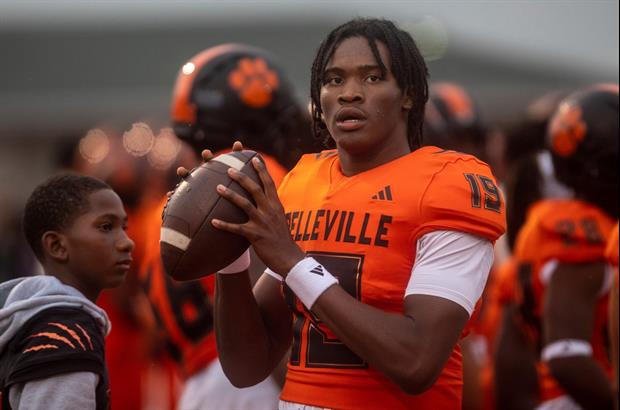- My Forums
- Tiger Rant
- LSU Recruiting
- SEC Rant
- Saints Talk
- Pelicans Talk
- More Sports Board
- Fantasy Sports
- Golf Board
- Soccer Board
- O-T Lounge
- Tech Board
- Home/Garden Board
- Outdoor Board
- Health/Fitness Board
- Movie/TV Board
- Book Board
- Music Board
- Political Talk
- Money Talk
- Fark Board
- Gaming Board
- Travel Board
- Food/Drink Board
- Ticket Exchange
- TD Help Board
Customize My Forums- View All Forums
- Topic Sort Options
- Trending Topics
- Recent Topics
- Active Topics
Full Transcript Jay Johnson's Introductory Press Conference
by Staff Reporter
June 29, 20210 Comments
Here is the full transcript from Jay Johnson's introductory press conference on Monday:
JAY JOHNSON: I don't think I can do it as well as Coach O, but Geaux Tigers! Start this thing off right. That was the only thing we need to say to start this thing off.
I'm honored to be here. I'm incredibly humbled to be here. When I think about the 44 years of my entire life, I really believe every day has led me to this podium right now, to this program, and it's beyond a dream come true.
I didn't come here for any other reason because this doesn't come along but one time in your life, and I view this opportunity to be the head baseball coach at LSU as the opportunity of my lifetime.
Getting started, gratitude is a big thing to me. You don't get to a moment like this without the help of really, really influential and important people. President Galligan, I haven't got a chance to meet you yet until we shook hands right there, but I am very honored to meet you. I'm honored to have this opportunity that you ultimately signed off on with the advisement of Scott and the athletic department and these two great Hall of Fame coaches. So thank you.
Scott, Stephanie, Dan, Verge, thank you. I'm honored to be here, and I really, really respect and appreciate how you guys approached me through this entire time, and there's nothing I want to do more than to give you exactly what you want and want to see just right over there on that field, and I'm going to do everything in my power to do that, to make you guys, the state of Louisiana, LSU, the Baton Rouge community incredibly proud. That is my mission, and that is what we have started working on a couple days ago.
These two guys right here, Coach Bertman and Coach Mainieri, start with Coach Bertman. I've got a great story about Coach Bertman. I didn't get a chance to meet him until last night, but I was a very young coach like 24 years old, 23 years old coaching like Connie Mack baseball, and I had no idea what I was doing at that point in time, so who's the best in the country at what I want to do? It was Skip Bertman. So I bought his videotape, so he made some money off me a long time ago. It was called "How to win the big one."
I can't tell you how influential that was that my development as a coach. I have a great story about this, too. I was coaching 16- to 18-year-old boys, and your speech, speeches and your motivational sheets and all of these things that you utilized to motivate your players to do amazing things. Five national championships in a 10-year period is legendary. I look at this man and I see the John Wooden of college baseball. This is the greatest college baseball coach of my entire lifetime.
Coach, we didn't meet until yesterday, we didn't talk on the phone until a couple days ago, but you've been influencing me for a very long time. I want to say thank you for that. I'm not standing here today if it's not for that right there, because winning is about people and getting people to do things that they didn't think were possible.
Everybody knows what a good baseball player looks like. They can see it. It's tangible. You can touch it. You can put it on a radar gun. You can look at it with pitch ability, but it's another thing to get that person to really believe that they're important, they have value and they can become anything that they want to become.
The Hold on to the Ropes story was told in a small town in California, like we'll go 2001, so 20 years ago, and I believe that was the start of my journey here.
So Coach, thank you for showing exactly how this was to be done.
Coach Mainieri. At 29 years old at the University of San Diego, probably in June, probably sometime right around this time, Coach Mainieri was hired at LSU, and I watched that press conference, and I'm not into that sort of thing all the time, but who's Skip Bertman going to choose to lead LSU baseball back to national prominence? Paul Mainieri.
I remember, Coach, watching that day and thinking about you that's exactly how I want to do this, and it was very clear to me that Coach made the right choice.
Another great story about Coach Mainieri that I'll never forget, I was at the convention in San Diego in maybe 2002 or 2003 and Coach Mainieri's speech was how do you win in cold weather. He was at Notre Dame, so I'm like, man, I'm coaching in San Diego right now, I can't wait to hear this. So Coach Mainieri goes up there, and he goes, people were asking me, how did you do it, how did you get to Omaha at Notre Dame. He goes, yeah, it's real simple how to win in the cold; the first thing you've got to do it put on a jacket. And he puts on a jacket.
And right then and there, that was an example of another man, another leader that really knew exactly how to inspire people to get to people and all of those things.
Now fast forward 15 years, the day Coach Mainieri announced his retirement. The SEC Network is on all over the United States, and we had a late game that night. It was in the afternoon, and Coach was probably up here in the same room talking about retiring, and I watched the press conference, for no other reason than I just wanted to hear him talk about his journey, his lifelong passion, where he was at, how he got to that point.
Coach, the class that you displayed in that was something that's what I want to emulate on a daily basis. Thank you for setting such a great example as a national championship coach that did everything exactly how it needed to be done. At that time there was nothing on my mind other than getting to Omaha and the College World Series, but I shot Coach a text and I just said, Thank you for being such a good example. This is exactly how I want to do this.
A day later Coach got back to me, and a week later they're in the NCAA tournament, in the loser's bracket, lose the first one, got to win four in a row. All three of us have been in that position before at some point in time and have gotten out of regionals and won regionals. For your team to do that, thankfully my team won three games on Sunday, so I got to watch the Tigers on Monday night and how you manipulated the pitching. You got the best out of what you had. Your guys really rose to the occasion for you that night. That really inspired me. For you to finish your career that way being a regional champion was amazing, and that's a reflection of your leadership.
More than anybody else, these two men right here, that's why I call this the honor of my lifetime, okay, to be entrusted with a program that Coach Bertman built and that Coach Mainieri carried on with first class every day that they did it.
The only thing better that they are than baseball coaches is incredible human beings. I'm glad you're both in town. I'm glad I have both of your phone numbers, and it will be used continually as we try to carry on this legacy that both of you guys have done an amazing job building. So thank you, guys. Let's give these two a hand, please.
I've gotten a lot of questions about why here and why now. I think I've just explained that relative to the coaches.
Ben McDonald, Todd Walker, Eddy Furniss, Warren Morris, Coach Bertman's guys. You literally couldn't turn on the TV in the '90s and not see that purple jersey running around Omaha. I remember exactly where I was in 1996 when Warren Morris hit the walk-off home run. I was a very average junior college second baseman and I remember thinking, man, I really wish I was Warren Morris at that time.
I remember exactly the walk-off win against Stanford in 2000 to win the national championship and being down in the ninth inning and your guys continuing to believe, continuing to push. Everything you want as a coach, your players rising to the occasion at the most important time of the game. Again, a reflection of your leadership.
And when I think about Coach Mainieri, Ryan Theriot, DJ LaMahieu, Anthony Ranaudo, Alex Bregman, the list goes on and on. I really don't want to leave anybody out, but think about those names and the future players that are going to come to LSU. You can't have better examples of what you want to achieve someday.
Everything is possible here when you talk about Omaha, when you talk about national championships, when you talk about training to become a Major League player someday, and the winning and the championships are great, and that's what we're here for. That only happens through elite development. Again, a testament to these two men. That's exactly what we're going to do here is we're going to develop players, and I'm excited to do that.
We've started that process, being on the phone with them, initial contact, getting to know guys, diving into that from the very first day of school. What they're doing right now in summer ball is all going to be part of the journey to lead them to being the very best player that they can be.
These two coaches, those players and every other player that's an LSU alum, all I want to do, as Coach Mainieri said, he wanted to make Skip proud, I want to carry that on. When I feel any great responsibility in this, not to myself, I'm going to work harder than any baseball coach in the country, any coach in the country. Our players are going to be -- there's going to be a lot demanded of them. They're going to work harder than any other college baseball team in the country.
We're not going to win because it says Tigers across our chests. We're going to win because of the heartbeat inside of the player with Tigers on his chest, the head, the decision making of the player that has Tigers written across his chest, and doing things on a daily basis that are going to lead to the improvements necessary to be an elite Division I baseball team that's playing their best at the end of the season, that can create opportunities for themselves and then capitalize on them when they have them.
A couple other more personal thank yous. My wife Maureen is here. There's oftentimes coaches will talk about their spouse and they understand it. They get it, the lifestyle of a coach. Why a woman would want to marry a high-level Division I baseball coach, they're out of their minds. She's way smarter than that. She doesn't just understand it, she makes our program better, and as you guys get to know her as a community, our team, I have the best wife in the world, to help me do my job at the level that it needs to be done, to put LSU exactly where we all want LSU baseball to be. Maureen, thank you.
I've had three great coaches and mentors in my life. Their names you don't know, but I would not be standing here at this podium at this press conference at Louisiana state University without them. The first one is my dad. I was very lucky to get an early start on what is a coach, what is a great coach, and so my dad, from the time I was this big, the expectations were high relative to work ethic, relative to what was required to be the best. He was a football and a track coach, and to give you some perspective on it, he did not lose a track meet for literally a 10-year period and all of those guys made for a pretty good football team, as well. So I grew up at seven, eight, nine years old watching game tape.
I don't know if Coach O is here, but if you need any help with the Wing T offense or goal-line package or those types of things, I love football, so Geaux Tigers, and I can't wait to be a part of those games in the fall.
My dad showed me exactly how to do this thing, held a high standard. That's all I've known for my entire life, which has led to preparation for an opportunity like this.
Scott Sarver was my college coach, and I was a very, I'll call it, average player. Did things well a lot of the time, did things not so well sometimes. But he saw something in me and gave me an opportunity from playing career is over to immediately coaching, and at 23, 24 years old, run out to third base, run the offense, go recruit, figure out ways to get better players.
I didn't approach that job like I was at an NAIA school, I approached it like I was at LSU. I got to learn, I got to develop, I got to make mistakes, I got to see what worked, and was a really, really key piece and time in my development, so I wanted to talk about that. Thank Coach Sarver.
After I was the head coach at Point Loma, I made the most difficult decision, in my opinion, in my coaching career, to go to the University of San Diego and coach for a man named Rich Hill and have the opportunity to be his associate head coach at the University of San Diego. I got an eight-year crash course in exactly how an elite Division I baseball program should be run. When you talk about teaching, motivating, developing, how you treat your players, how you hold them accountable and all of that, did the most important thing it could do for me to get to a point like this, which is it showed me how to do it.
I was given great autonomy to do my job within the program like I was a head coach, and the greatest compliment I got from Coach Hill was you're not like everybody else, you did this for eight years like this was your program.
The example, the opportunity to fail, the opportunity to succeed prepared me for when I went to the University of Nevada and the University of Arizona, and Scott mentioned the quick turnarounds. There's a blueprint to that which I'll talk about briefly. But those three men I owe my coaching career to.
Probably the most important -- not probably, the most important product that any coach and the most impressive product that will be in our program will be our players, and I've been very blessed at four different schools to have players of elite talent, of elite competitiveness and of elite character.
The same thing will be demanded of the LSU Tigers baseball team at a high level. I can't wait to get started and to be in the locker room and look them in the eyes and talk about the expectations, not of winning but what it takes to win because you guys will be here on a Friday night on a one-run game and we're going to find a way to win that game, but that game will be on the practice field, in the weight room, in team meetings, in individual meetings, by doing the right thing on a daily basis, and the improvement will come out and put us on top of a 4-3 game, and you guys will be on your feet cheering, being very proud of what you're seeing, of a team that's at its best when its best is needed, which John Wooden defined competitive greatness that way.
I get asked all the time, how are you going to do it. Okay, it's LSU. Expectations, all of those types of things. That's why I came here. You stare challenges in the face and you go do it.
Here's how we're going to do it. We're going to recruit. What does that mean? We're going to sell a vision of the elite college baseball program in the country where anything is possible. You get a chance to be the next Warren Morris at the plate in the ninth inning of the College World Series and come through. You get a chance to be the next Alex Bregman. Everything is possible here. Not easy; every day will matter in terms of building you to that point in time. And at that point in time, you'll be ready when that is what's called for.
What does that look like? That looks like a player of elite talent, elite character with a work ethic known to mankind because that is what's going to be required to be successful in our program.
Development, there's no better place, and I've walked in the room over here the other day with looking at all the Major League jerseys. Every player out there that's a 15-, 16-, 17-, 18-year-old player that's looking at the elite programs across the SEC, across the country, wants to be a Major League player. If you are listening right now, there will be no better place for you to develop to achieve your dream of being a Major League player someday.
With that being said, you'll be required to be an elite teammate, an elite person, and combining those things together, there's no limit to what you can accomplish.
Recruit, develop, win. And I know what that means to you. It means the same thing to me. But it means something else. What is important now? We can't go to Omaha today. But our players out in summer baseball can be doing something that can move us in that direction. Our players that are in the weight room or summer school can be doing something today that is moving us in that direction.
When we get to September 1st and we're on the field and four-on-ones or skill work, we're going to be doing something to move us in that direction, and where we're at that day is the most important day. You stack up a lot of those days and then you can start talking about Omaha, Nebraska, and national championships, but you have to earn the right to do that.
Every day we're going to be building this program to do that by focusing on what is exactly in front of us at that point in time.
And then you have to repeat it. LSU is not going to win championships because of things that happened in the past. LSU is going to win championships because of the decisions everybody involved in the program, our administration, our coaching staff, our players, our support staff, our fans are all united, all aligned doing the things that they need to do to ensure that happens.
So recruit, develop, win, what's important now, and then we constantly have to be repeating that process.
What is my goal? My goal is when you look out on that field at Alex Box Stadium, there's a brand of baseball that everybody in this state, in this community associated with this university is incredibly proud of. You know what that looks like. You've seen it. No program in college baseball has seen it on a more consistent basis than LSU. All I want to do is pour my life into continuing that.
Without anything else, I couldn't be more excited to be here. Thank you, Scott, again, for the opportunity. This state, this university is going to get everything that I've got. And the same thing out of our players, and Geaux Tigers.
JAY JOHNSON: I don't think I can do it as well as Coach O, but Geaux Tigers! Start this thing off right. That was the only thing we need to say to start this thing off.
I'm honored to be here. I'm incredibly humbled to be here. When I think about the 44 years of my entire life, I really believe every day has led me to this podium right now, to this program, and it's beyond a dream come true.
I didn't come here for any other reason because this doesn't come along but one time in your life, and I view this opportunity to be the head baseball coach at LSU as the opportunity of my lifetime.
Getting started, gratitude is a big thing to me. You don't get to a moment like this without the help of really, really influential and important people. President Galligan, I haven't got a chance to meet you yet until we shook hands right there, but I am very honored to meet you. I'm honored to have this opportunity that you ultimately signed off on with the advisement of Scott and the athletic department and these two great Hall of Fame coaches. So thank you.
Scott, Stephanie, Dan, Verge, thank you. I'm honored to be here, and I really, really respect and appreciate how you guys approached me through this entire time, and there's nothing I want to do more than to give you exactly what you want and want to see just right over there on that field, and I'm going to do everything in my power to do that, to make you guys, the state of Louisiana, LSU, the Baton Rouge community incredibly proud. That is my mission, and that is what we have started working on a couple days ago.
These two guys right here, Coach Bertman and Coach Mainieri, start with Coach Bertman. I've got a great story about Coach Bertman. I didn't get a chance to meet him until last night, but I was a very young coach like 24 years old, 23 years old coaching like Connie Mack baseball, and I had no idea what I was doing at that point in time, so who's the best in the country at what I want to do? It was Skip Bertman. So I bought his videotape, so he made some money off me a long time ago. It was called "How to win the big one."
I can't tell you how influential that was that my development as a coach. I have a great story about this, too. I was coaching 16- to 18-year-old boys, and your speech, speeches and your motivational sheets and all of these things that you utilized to motivate your players to do amazing things. Five national championships in a 10-year period is legendary. I look at this man and I see the John Wooden of college baseball. This is the greatest college baseball coach of my entire lifetime.
Coach, we didn't meet until yesterday, we didn't talk on the phone until a couple days ago, but you've been influencing me for a very long time. I want to say thank you for that. I'm not standing here today if it's not for that right there, because winning is about people and getting people to do things that they didn't think were possible.
Everybody knows what a good baseball player looks like. They can see it. It's tangible. You can touch it. You can put it on a radar gun. You can look at it with pitch ability, but it's another thing to get that person to really believe that they're important, they have value and they can become anything that they want to become.
The Hold on to the Ropes story was told in a small town in California, like we'll go 2001, so 20 years ago, and I believe that was the start of my journey here.
So Coach, thank you for showing exactly how this was to be done.
Coach Mainieri. At 29 years old at the University of San Diego, probably in June, probably sometime right around this time, Coach Mainieri was hired at LSU, and I watched that press conference, and I'm not into that sort of thing all the time, but who's Skip Bertman going to choose to lead LSU baseball back to national prominence? Paul Mainieri.
I remember, Coach, watching that day and thinking about you that's exactly how I want to do this, and it was very clear to me that Coach made the right choice.
Another great story about Coach Mainieri that I'll never forget, I was at the convention in San Diego in maybe 2002 or 2003 and Coach Mainieri's speech was how do you win in cold weather. He was at Notre Dame, so I'm like, man, I'm coaching in San Diego right now, I can't wait to hear this. So Coach Mainieri goes up there, and he goes, people were asking me, how did you do it, how did you get to Omaha at Notre Dame. He goes, yeah, it's real simple how to win in the cold; the first thing you've got to do it put on a jacket. And he puts on a jacket.
And right then and there, that was an example of another man, another leader that really knew exactly how to inspire people to get to people and all of those things.
Now fast forward 15 years, the day Coach Mainieri announced his retirement. The SEC Network is on all over the United States, and we had a late game that night. It was in the afternoon, and Coach was probably up here in the same room talking about retiring, and I watched the press conference, for no other reason than I just wanted to hear him talk about his journey, his lifelong passion, where he was at, how he got to that point.
Coach, the class that you displayed in that was something that's what I want to emulate on a daily basis. Thank you for setting such a great example as a national championship coach that did everything exactly how it needed to be done. At that time there was nothing on my mind other than getting to Omaha and the College World Series, but I shot Coach a text and I just said, Thank you for being such a good example. This is exactly how I want to do this.
A day later Coach got back to me, and a week later they're in the NCAA tournament, in the loser's bracket, lose the first one, got to win four in a row. All three of us have been in that position before at some point in time and have gotten out of regionals and won regionals. For your team to do that, thankfully my team won three games on Sunday, so I got to watch the Tigers on Monday night and how you manipulated the pitching. You got the best out of what you had. Your guys really rose to the occasion for you that night. That really inspired me. For you to finish your career that way being a regional champion was amazing, and that's a reflection of your leadership.
More than anybody else, these two men right here, that's why I call this the honor of my lifetime, okay, to be entrusted with a program that Coach Bertman built and that Coach Mainieri carried on with first class every day that they did it.
The only thing better that they are than baseball coaches is incredible human beings. I'm glad you're both in town. I'm glad I have both of your phone numbers, and it will be used continually as we try to carry on this legacy that both of you guys have done an amazing job building. So thank you, guys. Let's give these two a hand, please.
I've gotten a lot of questions about why here and why now. I think I've just explained that relative to the coaches.
Ben McDonald, Todd Walker, Eddy Furniss, Warren Morris, Coach Bertman's guys. You literally couldn't turn on the TV in the '90s and not see that purple jersey running around Omaha. I remember exactly where I was in 1996 when Warren Morris hit the walk-off home run. I was a very average junior college second baseman and I remember thinking, man, I really wish I was Warren Morris at that time.
I remember exactly the walk-off win against Stanford in 2000 to win the national championship and being down in the ninth inning and your guys continuing to believe, continuing to push. Everything you want as a coach, your players rising to the occasion at the most important time of the game. Again, a reflection of your leadership.
And when I think about Coach Mainieri, Ryan Theriot, DJ LaMahieu, Anthony Ranaudo, Alex Bregman, the list goes on and on. I really don't want to leave anybody out, but think about those names and the future players that are going to come to LSU. You can't have better examples of what you want to achieve someday.
Everything is possible here when you talk about Omaha, when you talk about national championships, when you talk about training to become a Major League player someday, and the winning and the championships are great, and that's what we're here for. That only happens through elite development. Again, a testament to these two men. That's exactly what we're going to do here is we're going to develop players, and I'm excited to do that.
We've started that process, being on the phone with them, initial contact, getting to know guys, diving into that from the very first day of school. What they're doing right now in summer ball is all going to be part of the journey to lead them to being the very best player that they can be.
These two coaches, those players and every other player that's an LSU alum, all I want to do, as Coach Mainieri said, he wanted to make Skip proud, I want to carry that on. When I feel any great responsibility in this, not to myself, I'm going to work harder than any baseball coach in the country, any coach in the country. Our players are going to be -- there's going to be a lot demanded of them. They're going to work harder than any other college baseball team in the country.
We're not going to win because it says Tigers across our chests. We're going to win because of the heartbeat inside of the player with Tigers on his chest, the head, the decision making of the player that has Tigers written across his chest, and doing things on a daily basis that are going to lead to the improvements necessary to be an elite Division I baseball team that's playing their best at the end of the season, that can create opportunities for themselves and then capitalize on them when they have them.
A couple other more personal thank yous. My wife Maureen is here. There's oftentimes coaches will talk about their spouse and they understand it. They get it, the lifestyle of a coach. Why a woman would want to marry a high-level Division I baseball coach, they're out of their minds. She's way smarter than that. She doesn't just understand it, she makes our program better, and as you guys get to know her as a community, our team, I have the best wife in the world, to help me do my job at the level that it needs to be done, to put LSU exactly where we all want LSU baseball to be. Maureen, thank you.
I've had three great coaches and mentors in my life. Their names you don't know, but I would not be standing here at this podium at this press conference at Louisiana state University without them. The first one is my dad. I was very lucky to get an early start on what is a coach, what is a great coach, and so my dad, from the time I was this big, the expectations were high relative to work ethic, relative to what was required to be the best. He was a football and a track coach, and to give you some perspective on it, he did not lose a track meet for literally a 10-year period and all of those guys made for a pretty good football team, as well. So I grew up at seven, eight, nine years old watching game tape.
I don't know if Coach O is here, but if you need any help with the Wing T offense or goal-line package or those types of things, I love football, so Geaux Tigers, and I can't wait to be a part of those games in the fall.
My dad showed me exactly how to do this thing, held a high standard. That's all I've known for my entire life, which has led to preparation for an opportunity like this.
Scott Sarver was my college coach, and I was a very, I'll call it, average player. Did things well a lot of the time, did things not so well sometimes. But he saw something in me and gave me an opportunity from playing career is over to immediately coaching, and at 23, 24 years old, run out to third base, run the offense, go recruit, figure out ways to get better players.
I didn't approach that job like I was at an NAIA school, I approached it like I was at LSU. I got to learn, I got to develop, I got to make mistakes, I got to see what worked, and was a really, really key piece and time in my development, so I wanted to talk about that. Thank Coach Sarver.
After I was the head coach at Point Loma, I made the most difficult decision, in my opinion, in my coaching career, to go to the University of San Diego and coach for a man named Rich Hill and have the opportunity to be his associate head coach at the University of San Diego. I got an eight-year crash course in exactly how an elite Division I baseball program should be run. When you talk about teaching, motivating, developing, how you treat your players, how you hold them accountable and all of that, did the most important thing it could do for me to get to a point like this, which is it showed me how to do it.
I was given great autonomy to do my job within the program like I was a head coach, and the greatest compliment I got from Coach Hill was you're not like everybody else, you did this for eight years like this was your program.
The example, the opportunity to fail, the opportunity to succeed prepared me for when I went to the University of Nevada and the University of Arizona, and Scott mentioned the quick turnarounds. There's a blueprint to that which I'll talk about briefly. But those three men I owe my coaching career to.
Probably the most important -- not probably, the most important product that any coach and the most impressive product that will be in our program will be our players, and I've been very blessed at four different schools to have players of elite talent, of elite competitiveness and of elite character.
The same thing will be demanded of the LSU Tigers baseball team at a high level. I can't wait to get started and to be in the locker room and look them in the eyes and talk about the expectations, not of winning but what it takes to win because you guys will be here on a Friday night on a one-run game and we're going to find a way to win that game, but that game will be on the practice field, in the weight room, in team meetings, in individual meetings, by doing the right thing on a daily basis, and the improvement will come out and put us on top of a 4-3 game, and you guys will be on your feet cheering, being very proud of what you're seeing, of a team that's at its best when its best is needed, which John Wooden defined competitive greatness that way.
I get asked all the time, how are you going to do it. Okay, it's LSU. Expectations, all of those types of things. That's why I came here. You stare challenges in the face and you go do it.
Here's how we're going to do it. We're going to recruit. What does that mean? We're going to sell a vision of the elite college baseball program in the country where anything is possible. You get a chance to be the next Warren Morris at the plate in the ninth inning of the College World Series and come through. You get a chance to be the next Alex Bregman. Everything is possible here. Not easy; every day will matter in terms of building you to that point in time. And at that point in time, you'll be ready when that is what's called for.
What does that look like? That looks like a player of elite talent, elite character with a work ethic known to mankind because that is what's going to be required to be successful in our program.
Development, there's no better place, and I've walked in the room over here the other day with looking at all the Major League jerseys. Every player out there that's a 15-, 16-, 17-, 18-year-old player that's looking at the elite programs across the SEC, across the country, wants to be a Major League player. If you are listening right now, there will be no better place for you to develop to achieve your dream of being a Major League player someday.
With that being said, you'll be required to be an elite teammate, an elite person, and combining those things together, there's no limit to what you can accomplish.
Recruit, develop, win. And I know what that means to you. It means the same thing to me. But it means something else. What is important now? We can't go to Omaha today. But our players out in summer baseball can be doing something that can move us in that direction. Our players that are in the weight room or summer school can be doing something today that is moving us in that direction.
When we get to September 1st and we're on the field and four-on-ones or skill work, we're going to be doing something to move us in that direction, and where we're at that day is the most important day. You stack up a lot of those days and then you can start talking about Omaha, Nebraska, and national championships, but you have to earn the right to do that.
Every day we're going to be building this program to do that by focusing on what is exactly in front of us at that point in time.
And then you have to repeat it. LSU is not going to win championships because of things that happened in the past. LSU is going to win championships because of the decisions everybody involved in the program, our administration, our coaching staff, our players, our support staff, our fans are all united, all aligned doing the things that they need to do to ensure that happens.
So recruit, develop, win, what's important now, and then we constantly have to be repeating that process.
What is my goal? My goal is when you look out on that field at Alex Box Stadium, there's a brand of baseball that everybody in this state, in this community associated with this university is incredibly proud of. You know what that looks like. You've seen it. No program in college baseball has seen it on a more consistent basis than LSU. All I want to do is pour my life into continuing that.
Without anything else, I couldn't be more excited to be here. Thank you, Scott, again, for the opportunity. This state, this university is going to get everything that I've got. And the same thing out of our players, and Geaux Tigers.
Filed Under: LSU Baseball
Popular Stories
Latest Headlines
